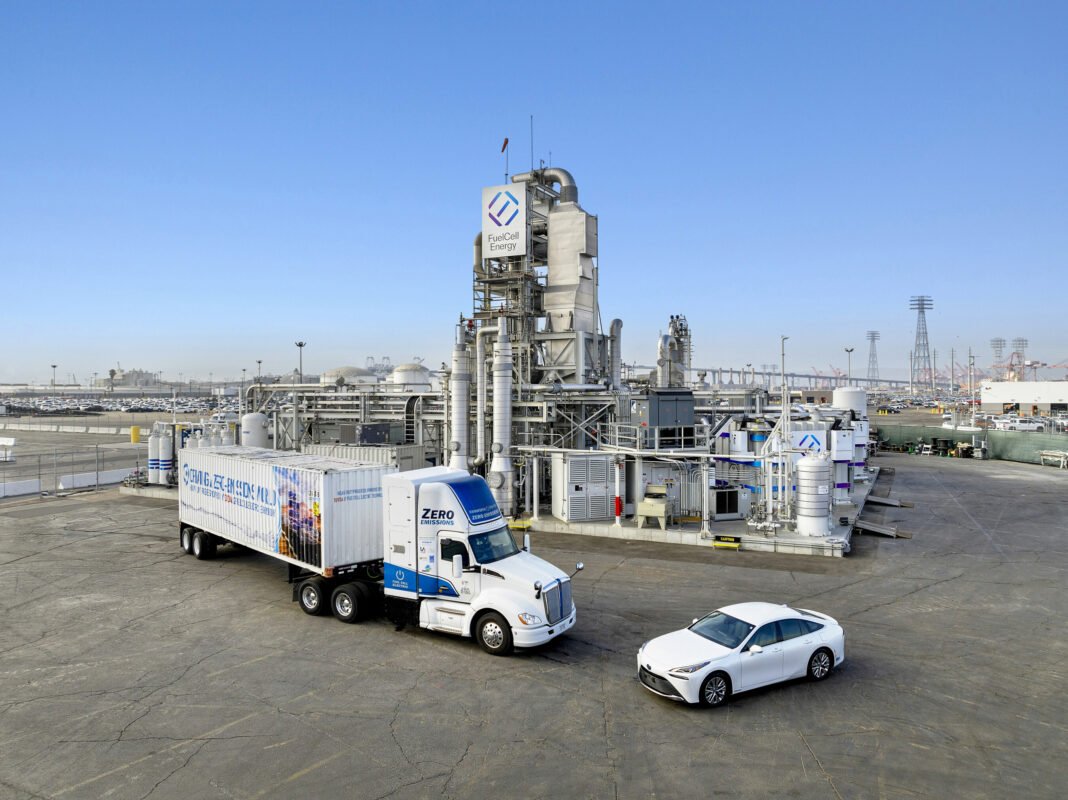TLS Long Beach is set to become the first port vehicle processing facility globally to be entirely powered by onsite-generated, 100 percent renewable energy.

In a monumental stride towards sustainable energy solutions, FuelCell Energy, Inc. (Nasdaq: FCEL) and Toyota Motor North America, Inc. have announced the successful completion of the world’s first “Tri-gen system.” This pioneering technology, located at Toyota’s Port of Long Beach operations, marks a significant breakthrough in renewable energy production.
The Tri-gen system, owned and operated by FuelCell Energy, harnesses the power of directed biogas to generate three invaluable products: renewable electricity, renewable hydrogen, and usable water. This innovative process epitomizes FuelCell Energy’s prowess in scaling hydrogen-powered fuel cell technology, an integral component in the global campaign to combat carbon emissions.
Toyota Logistic Services (TLS) Long Beach is set to become the first port vehicle processing facility globally to be entirely powered by onsite-generated, 100 percent renewable energy. This remarkable achievement aligns with Toyota’s unwavering commitment to environmental sustainability and sets a compelling precedent for similar ventures worldwide.
Chris Reynolds, Chief Administrative Officer at Toyota, emphasized the trailblazing nature of this endeavor, stating, “By utilizing only renewable hydrogen and electricity production, TLS Long Beach will blaze a trail for our company.” He further noted the replicability of this real-world example in various regions across the globe, showcasing the project’s potential impact on a global scale.
FuelCell Energy CEO, Jason Few, highlighted the shared commitment of both companies towards surpassing clean energy objectives. He emphasized that this collaboration sends a powerful message about the benefits of hydrogen-based energy for business, local communities, and the environment.
The Tri-gen system will play a pivotal role in supporting Toyota’s port operations through an electrochemical process that converts directed renewable biogas into electricity, hydrogen, and usable water. This highly efficient, combustion-free process emits virtually no air pollutants, underlining its eco-friendliness.
Notably, Tri-gen will generate 2.3 megawatts of renewable electricity, with a portion dedicated to supporting TLS Long Beach’s port operations. Additionally, the system can produce up to 1,200 kg/day of hydrogen, fulfilling the fueling needs of TLS Long Beach’s incoming light-duty fuel cell electric vehicle (FCEV) Mirai, and supplying hydrogen to a nearby heavy-duty hydrogen refueling station.
Furthermore, the Tri-gen system is set to significantly benefit the community by reducing over 9,000 tons of CO₂ emissions annually from the power grid. It will also aid in avoiding more than six tons of harmful grid NOx emissions, while potentially reducing diesel consumption by over 420,000 gallons per year in port operations.
In an additional display of environmental stewardship, excess electricity not utilized by TLS will be supplied to Southern California Edison, contributing to the renewable, resilient, and affordable baseload electric generation resources under the California Bioenergy Market Adjustment Tariff (BioMAT) program.
The completion of the Tri-gen system stands as a testament to the potential of hydrogen-based fuel cell technology in revolutionizing sustainable energy practices, setting a new standard for future endeavors in the field.